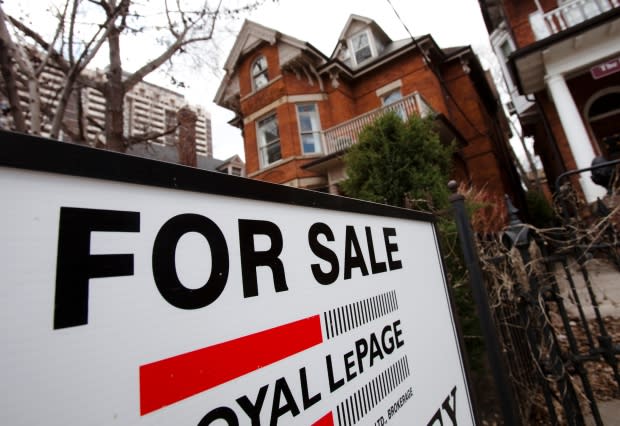'Housing paying for housing': Councillors say land transfer tax hike on $3M homes could fund housing subsidies
A coalition of Toronto councillors are pushing the city to offer more housing allowances for struggling families by adding a new land transfer tax tier on the city's priciest homes.
It's "housing paying for housing," according to Coun. Joe Cressy, who announced the concept on Friday while flanked by fellow councillors Ana Bailao and Brad Bradford.
The trio are calling for a new top municipal land transfer tax tier of 3 per cent for homes valued at $3 million or more. Right now, the top tier is a 2.5 per cent tax for homes valued at more than $2 million, with buyers footing the bill.
On a $4 million home, for instance, that would hike the total amount someone has to pay from around $86,500 to nearly $91,500 — a roughly $5,000 increase.
Every $1 million in investment generated from the new tier, the councillors say, could provide hundreds of dollars each month in housing allowances to around 200 households.
It's a move they're deeming critical, with thousands of people relying nightly on shelters and drop-in centres and more than 180,000 people on a wait-list for permanent affordable housing.
"We can't allow shelters to be somebody's home," said Bailao.
The announcement's timing comes as federal and provincial funding for the allowance program, which currently serves more than 5,000 households in Toronto, is drying up. The program's stream targeting the city's chronic homeless population is set to stop taking in new recipients later this year.
Targeting revenue from a new land transfer tax tier towards housing allowances would be one step towards "addressing homelessness in our city," Cressy said.
But the proposal is now being met with a mix of praise — and scrutiny.

Mayor plans to support motion at council
Community advocate Gil Penalosa, chair of the non-profit 8 80 Cities, called the proposed new tier long overdue, stressing the high number of people "struggling" who need a leg up.
"If anything, I think it could've been more aggressive," Penalosa said.
However, real estate expert and Realosophy president John Pasalis believes it's a risky plan that could create "distortions" in the housing market. Hiking taxes on luxury homes, he explained, could discourage current homeowners from up-sizing, which could have the unintended consequence of further tightening supply.
While the councillors cited a nearly decade-long increase in the number of homes sold with values of more than $3 million — a more than 300 per cent jump since 2010 — Pasalis also noted the market has recently softened.
"There isn't a lot of sympathy for people buying $3 million homes, but they're not really the problem," added Christine Van Geyn, Ontario director of the Canadian Taxpayers Federation. "The problem is a lack of affordable housing. It's a supply issue."
Pasalsis said a better approach would be spreading the hit more broadly through city-wide property taxes. But that's a move already quashed by Mayor John Tory and council during this year's budget process, following his campaign trail vow to keep property taxes tied only to the rate of inflation.
As for the possibility of a new land transfer tax tier, Tory isn't explicitly ruling it out.
In a statement, the mayor's spokesperson, Don Peat, said Tory plans to support Cressy's motion at council and looks forward to seeing a report back from staff.
"He hopes the report will look at a wide range of options as to how to pay for these housing allowances," Peat added.

